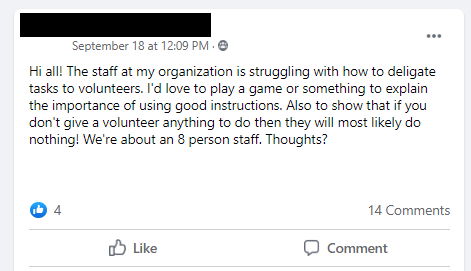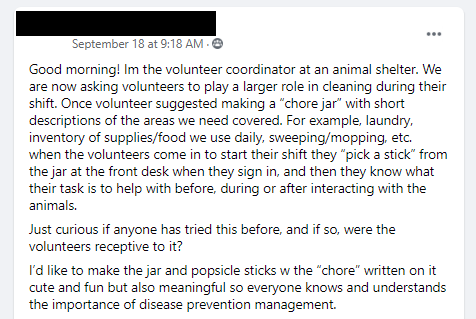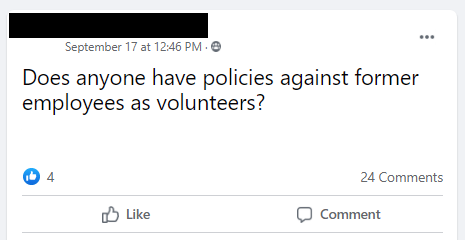The Real Lives of Volunteer Coordinators
A Blog for us to Learn from Each Other
Recap for September 20th - September 26th
Thanks to everyone who contributed to the Facebook community this week!
Delegating to Volunteers
It can sometimes be difficult to train other staff members on how they can effectively utilize volunteers. Depending on your organization, it may be helpful to complete an intentional training with staff members regarding what tasks could be delegated to volunteers. It’s also important for them to understand how to provide clear instructions since the volunteers won’t necessarily have the same context or understanding of the project. It may require some additional time in the beginning, but delegating activities to volunteers can save time in the long run.

Comments from the group
“Have you got role descriptions written for different volunteer roles, including a list of tasks for each role? It could be useful for staff to look through the list of tasks/role descriptions to get a good idea of what they can ask from volunteers.”
“If it's an opportunity like a specific event what we do is list the tasks that will be delegated on the day. If anyone has any preferences they let us know through the confirmation email beforehand so we can delegate accordingly.”
“I’ve often seen coordinators keep a stack of “do anytime” tasks available. Some things that always help and can be done by most people. The best success is when there’s some game or prize involved (e.g. who does most of the extracurricular stuff gets a bonus cookie in the end of the month)”
“Something I used in the animal training world that I took with me into this world of you are looking for a game-like style. Ask everyone to write down instructions on how to make a peanut butter and jelly sandwich. Then have people swap instructions with someone else, then provide them with actual loaves of bread and all the supplies to make one. People have to use the instructions to make the sandwich, but if it doesn’t provide details, it’s open to interpretation. Ex: “open the bread bag” but not saying untwist the tie, etc, means Someone could just rip the plastic bag anywhere. You learn pretty quickly that when details are left out, people interpret things differently and few people actually end up along the sandwich that the person writing instructions had In mind”
Check out all of the comments here!
Chore Jar
As a coordinator, it can sometimes be difficult to ensure tasks are available for volunteers at all times. If staff members are busy with other projects, volunteers may find themselves waiting until someone can provide them with directions for their next job. Our coordinators discussed some great ideas for creating a chore jar with ongoing tasks so volunteers can quickly move to the next task without waiting for direction.

Comments from the group
“This is a tried and true girl scout "kaper" keeper. I feel it would transfer nicely to your volunteers. Although there could be a volunteer or two who would prefer to have the same job each time (some people just prefer that or have physical limitations) but that seems doable too.”
“I had little laminated cards with the task, the location and the supplies needed (supplies just for volunteers kept on the shelf next to the cards). They would grab one from the to do side and move it to the done side. That way all was done once before cards were moved back to the to do side. I didn't have all the volunteers do them. Mostly our high school externs and the volunteers who joined to help with cleaning. Some other cleaning was part of the training for that specific role (cat, puppy, etc).”
“Love this idea! Might have to steal it”
Former Employees as Volunteers
In some situations, former employees might be eager to continue their involvement with an organization as a volunteer. As our coordinators discussed, some programs have policies in place for a mandatory waiting period before a former employee can transition to a volunteer role. This type of waiting period can provide a clearer distinction for their responsibilities and ensure someone isn’t continuing the work they did as a paid staff member. Some coordinators clarified that the policy may be different if someone wants to volunteer in a different department than they previously worked.

Comments from the group
“We have a policy that mandates a 2 month waiting period. Former employees cannot become volunteers until at least 60 days after their separation date.”
“Not if they left on good terms. Some of my volunteers are retirees from my organization.”
“For my hospice we do have a few volunteers that were former staff but we have to make it very clear what they are allowed to do as volunteers versus what they were doing as staff.”
“Must have left the agency in good standing. Can not work in the same department as employment for 1 year after separation.”
“We require 6 months off before returning to volunteer. It gives them time to settle into life without having an official affiliation with the organization. A lot choose to volunteer less than they initially said, which is entirely okay.”
 Written by
Written by